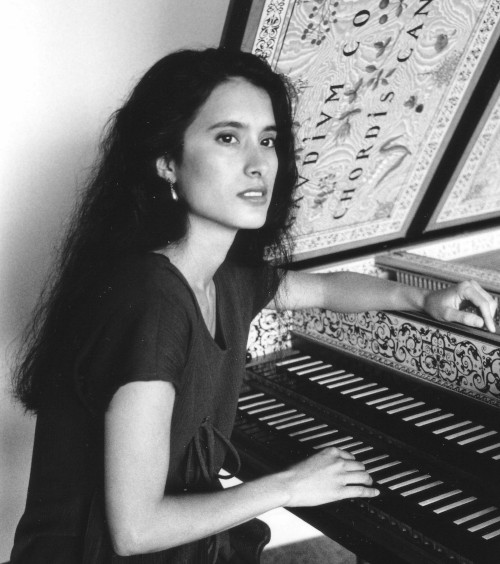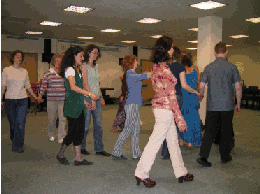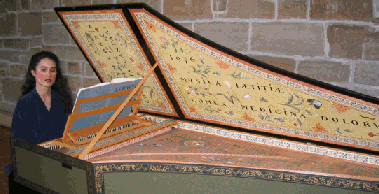Dr. Micaela Schmitz (originally from the U.S.) specialises in early keyboard instruments, including harpsichord, fortepiano and clavichord. She earned her Doctorate of Musical Arts (on 18th century keyboard music) under Arthur Haas at the Eastman School of Music, in Rochester, New York. This was preceded by a first degree in Music at U.C. Berkeley, and a Masters in Choral Conducting.
She spent two years studying with Jacques Ogg and Bart van Oort at the Royal Conservatory in The Hague on a Rotary Ambassadorial Scholarship. As a soloist she received acclaim for her performance of Bach’s Goldberg variations, which features an entertaining pre-concert talk to help audiences appreciate the masterpiece.
Programmes include ‘England V. Holland’, ‘For the Sun King’, ‘Dancing in the Isles’, and ‘The Fantastic and the Avant-Garde.’ She has performed with Laurence Cummings, Paul Simmonds (duo keyboard repertoire); gambist Jacqui Robertson-Wade, with baroque flutist Clare Beesley as the ensemble Terza Prattica, and with Cathryn Dew. Her ensemble Lady Georgianna offers costumed presentations. She has edited music of Christopher Wood. For over a decade, she edited Harpsichord and Fortepiano. She has conducted children’s choirs and gives workshops to a range of ages.

To listen to sample excerpts click here.
Further Information
Micaela has a special interest in original instruments. She served on the committee of The British Clavichord Society, and was the first member to join the British Harpsichord Society. She regularly visits historic instrument collections and gives gallery talks to highlight original instruments.
In 2007 Micaela was awarded a Finzi Trust Scholarship to research 18th century English and Scottish Song, some of which she performs with her ensemble Lady Georgianna.
She has premiered works of the late Christopher Wood with Jeanne Dolmetsch and with Jacqui Robertson, and is preparing some editions for publication. In ensemble with Robertson she received the accolade: ‘a beautifully judged account of Marais’ Folies d’Espagne, where the expressive potential of both bass viol and harpsichord were used to full effect…”(The Birmingham Post January 26, 2004).
As an educator, Micaela has inspired young people age 8-18, especially through the Worcesteshire Waits programme, which she co-founded with Cathryn Dew and Andrew Watts, and which was later administered by Worcestershire Early Music. She launched the Worcestershire Baroque Orchestra and Vocal Course, and has run the Worcester Early Music Week(end) since 2006.
Programmes:
The Goldberg Variations with an entertaining preconcert talk
The English Muse (harpsichord and clavichord)
Music of Byrd, Bull, Bach, Bartok, and Howells (who borrows from Ralph Vaughan Williams and Walton) – The programme shows borrowed styles and ideas in British music. Includes ‘Ralph’s Pavane’ and ‘Walton’s Toye’ by Howells…
‘Handeling Purcell’ (for their anniversary year in 2009)
18th century English repertoire, including Stanley, Greene, and of course Handel, compared with earlier compatriots, such as James Nares and Henry Purcell. Dance music rubs shoulders with drawing room.
The English and Dutch Connection
The concert is a musical journey linking virginalist composers. Full of impressive variations, and the exquisite working-out of folk melodies and plainchant, the programme includes a performance of the “great in nomine” of Bull, which features mixed meter throughout. It also links teachers, students, and influence (Blithemann’s and Byrd’s influence on Bull, who in turn may have influenced Sweelinck), and shows how one developed what the first began. The performance includes readings from letters, poetry, and history of the time.
The Fantastic, Galant, and Avant Garde
This programme explores the very expressive contrasted with the galant. Both were considered novel when composed, and they have the very same effect today. In some cases, these two styles are found in the same work! The concert features music in the Parisian avant garde, and include works that might have been for piano as well as harpsichord.
QUOTES
Micaela is a confident and sensitive player with a secure understanding of the music of this period, including experience of baroque dance, and …we heard an exciting performance, which was enthusiastically received by the audience. For me, the highlights were probably the Bull’s ‘In Nomine’, The Bells, and ‘Onder een linde groen’. All three in some ways seem to exemplify the music of their time, and being so well known demand something extra from the performer if they are really to impress. Micaela did this with complete success, and gave us some really spine-tingling moments.’
(Paula Woods, HPSCHD-L, 22 June 2005)
‘Micaela’s recital of the Goldbergs yesterday afternoon was truly beautiful and it was such a joy for me to hear a performance where the artist was listening to the instrument and the acoustics creating great music by doing so. Not a rush of tempo and an exhibition of what is a fine technique which is so often the case today I feel. The recital was also very well attended, not always the case here I’m afraid. Thank you Micaela and The Barber Institute. ‘
(Michael Johnson, HPSCHD-L, 15 November 2004)
‘MEMF [Midlands Early Music Forum] is fortunate in counting amongst its membership a number of highly gifted organists and harpsichordists… Micaela Schmitz certainly features amongst these, as her harpsichord recital at the Lord Leycester Hospital in Warwick on Saturday 22 May clearly showed.’ ‘both her programme-notes and her brief pre-concert talk were helpful in putting us into the right frame of mind to listen to this superbly-crafted music …the recital (partly in aid of the charity ‘Fight for Sight’) was gratifyingly well-attended. Her choice of tempi and registration seemed to me admirable, as did her grasp of the essential architecture that lies behind Bach’s innovative and ingenious design for the work.’
(Beresford King-Smith, Midlands Early Music Forum Newsletter, August 2004)
‘…avenues that challenge the notions of authenticity’
–Andrew Green, Early Music Today [August 2004, Worcester Festival]
‘the intimate space made contact between audience and performers effortless and created a sense of shared music making, much like it would have been in the time of this repertoire….’ ‘a beautifully judged account of Marais’ Folies d’Espagne, where the expressive potential of both bass viol and harpsichord were used to full effect…. ‘a very enjoyable occasion.’
–Anders Östberg, The Birmingham Post, January 26, 2004


